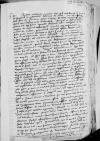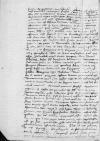Letter #922
Cornelis DE SCHEPPER to Ioannes DANTISCUSVienna, 1533-03-27
English register:
De Schepper has finally received a letter from Dantiscus. It took three months to reach him, although his whereabouts were well known. At that time Dantiscus had not yet received any letter from De Schepper; however, by now this problem should have been resolved.
He comments on the difficult time he went through, and summarises the news from his earlier letters: his wife's [Elisabeth Donche] childbirth, the losses [due to the floods] (which are less severe than feared), and the tempting job opportunities in France and elsewhere, of which he has informed the Emperor [Charles V].
He considers his current mission of little use, but he will loyally perform his duties and bear misfortunes with equanimity. The Bishop of Przemyśl [Jan Chojeński] as well as Jan Tarnowski offered him prospects in Poland, in case things go utterly wrong in his present career. He thanks Dantiscus for his support in this matter. Nevertheless, in Poland De Schepper would prefer to be with Dantiscus. He urges Dantiscus to enjoy above all the company of his family and friends, and to write to him.
He and the Archbishop of Lund [Johan Weze] are in Vienna for their current mission. They have conducted negotiations in Pressburg with the envoys of Count Janós [Thurzó], although Hieronymus Łaski, who was one of them, had already left.
The negotiations were suspended in anticipation of the arrival of the envoy of the Sultan [Suleiman the Magnificent], who comes to King Ferdinand with a peace proposal. The Sultan's desire for peace is undoubtedly inspired by fear after the recent military setbacks. De Schepper stresses that the Sultan is the one suing for peace, and is proposing an honourable and unconditional peace.
He denies the rumours that are circulating in Poland and Hungary, that the Emperor and the Pope [Clement VII] have agreed to a peace treaty in which King Ferdinand should cede territory of Sklavonia. Nor is it true that the pashas had to be bribed. The Sultan wishes to involve the Emperor in the peace, but that is not likely to happen any time soon.
They are expecting the response of the Emperor, to whom the Count of Salm [Niklas II Graf of Salm and Neuburg] was sent as an envoy. At the instance of the Sultan the Voivode [John Zápolya] has sent Alvise Gritti to defend his case. The partisans of the Voivode were wrong in their assumption that the Sultan was only willing to agree to peace when the Voivode could reign over all of Hungary. After the retreat of the Sultan from Pannonia, King Ferdinand discreetly inquired about his intentions, and it appeared that there was a great willingness to conclude a solid peace treaty.
De Schepper wishes Dantiscus all the best, and promises to send a short letter to Campensis. He sends special greetings to Dantiscus' brother-in-law [Johann Reyneck]. As his planned mission to Poland is not going to take place, he sends Dantiscus the greetings from his wife [Elisabeth Donche], his brother-in-law [Mark Laurijn] and other friends in writing.
He reports on the planned journey of the Emperor to Spain. The French pose no threat since a significant force, under the command dux of Thamyse [François Le Fèvre?], has been left behind in Italy. The interests of the Emperor are guaranteed by the alliance of Bologna, although the Venetians remain a risk factor.
The Archibishop of Bari [Esteban Gabriel Merino] has been made cardinal. Lord of Praet [Louis of Flanders] and all other acquaintances have left the court; only [Nicolas Perrenot] de Granvelle and [Francisco] de los Cobos remain. After his current assignment, De Schepper will return home and travel to Spain from there.
He regrets that by his frequent travelling he was unable to do more for the cause of the Queen of Poland [Bona Sforza], although he achieved some results. Godschalk [Ericksen] and he will remain committed to her interests.
He would write more but the sparse correspondence from Dantiscus makes him fear that his own letters are being intercepted. He emphasises at length the honourable character of the proposed peace with the Turks. He foresees a poor outcome for the Lutherans, and the Kings of England [Henry VIII] and France [Francis I].
| received [1533-04-12 — 1533-04-18] Manuscript sources:
Early printed source materials:
Prints:
| ||||||||||||||||||||||||||||||
Text & apparatus & commentary Plain text Text & commentary Text & apparatus
Reverendissimo in Christo Patri et Domino, domino
In
Salutem plurimam.
Deus meliorem mentem det istis tabellariis, quam habuere hactenus in perferendis litteris tuis et meis, vix enim quinque dies sunt, ex quo cf.
Offeruntur undique condiciones orig. conditiones⌈condicionescondiciones orig. conditiones⌉, tum ex
ms 1 [...] paper damaged⌈ams 2 a,
ms 1 [...] paper damaged⌉ usque ad extremum sum permansurus in officio boni viri, quem si
ms 1 [...] paper damaged⌈oms 2 o,
ms 1 [...] paper damaged⌉ animo et, postquam reipsa ostendero per me nihil omissum esse, respiciam vel postliminio ad res meas. Neque non possum maximas tibi gratias agere, quod talem te obtuleris futurum, qualis hactenus fuisti, neque parvae gloriae loco duco, quod in inclito orig. inclyto⌈inclitoinclito orig. inclyto⌉ vestro
ms 1 [...] paper damaged⌈isms 2 is,
ms 1 [...] paper damaged⌉ ad amicitiam provocavit, amicorum officia, quae eo sunt gratiora, quod ab integerrimis viris sincerissimoque orig. syncerissimoque⌈sincerissimoquesincerissimoque orig. syncerissimoque⌉ affectu profecta sciam. Nolo tamen diffiteri ad neminem me libentius venturum esse, quam ad te, si casus aliquis acerbior ingrueret, secundum te ad eos. Sed haems 2 c,
ms 1 [...] text damaged⌈cms 2 c,
ms 1 [...] text damaged⌉ Deus meliora faciet. Quare desine mea causa dolere et temet cum dulcissima
ms 1 [...] paper damaged⌈isms 2 is,
ms 1 [...] paper damaged⌉ oblectare, quibus officiosissime cupio commendare, et ad me aliquando scribe. Sciet enim
ms 1 [...] paper damaged⌈ensisms 2 ensis,
ms 1 [...] paper damaged⌉
ms 1 [...] paper damaged⌈domini Ioannms 2 domini Ioann,
ms 1 [...] paper damaged⌉is comitis Scepusiensis
ms 1 [...] paper damaged⌈et prudentia praeditisms 2 et prudentia praeditis,
ms 1 [...] paper damaged⌉. Magnificum tamen dominum
ms 1 [...] paper damaged⌈unusms 2 unus,
ms 1 [...] paper damaged⌉
 UUB, H.154, f. 114v
fuerat ex quattuor, non vidimus, abierat enim rediturus, nisi conventus interruptus fuisset. Cuius causa haec fuit, quod dum
UUB, H.154, f. 114v
fuerat ex quattuor, non vidimus, abierat enim rediturus, nisi conventus interruptus fuisset. Cuius causa haec fuit, quod dum
ms 2 affirmatione⌈offirmationems 1 offirmatione,
ms 2 affirmatione⌉ omnium in
Hoc tantum potuimus scripsisse. Exspectamus orig. Expectamus⌈ExspectamusExspectamus orig. Expectamus⌉ responsum a
Nos ad haec pauca Dominationi Tuae Reverendissimae commendamus et felicissime orig. foelicissime⌈felicissimefelicissime orig. foelicissime⌉ valere eandem orig. eamdem⌈eandemeandem orig. eamdem⌉ exoptamus.
ms 1 [...] paper damaged⌈istis grams 2 istis gra,
ms 1 [...] paper damaged⌉vissimis negoms 2 tiis,
ms 1 [...] paper damaged⌈tiisms 2 tiis,
ms 1 [...] paper damaged⌉.
 UUB, H.154, f. 115r
Deus te conservet incolumem cum tuis omnibus. Sororio tuo, tametsi amicorum et fratrum nomine eum prius comprehenderim, meo nomine plurimam salutem dicito, quia, quod et ille se mihi commendaret, scripsisti. Et bene vale, Domine et Amice, et Pater vere amate, et Deus te conservet. Si non tam brevi, semel tamen conveniemus, ubi
cf. Vulg. Apc 2:23:3 dabo unicuique vestrum secundum opera vestra; Vulg. Apc 20.14.4-5 et iudicatum est de singulis secundum opera ipsorum; Vulg. Apc 22.12.1-2 ecce venio cito et merces mea mecum est: reddere uniciuque secundum opera sua; Vulg. Rm 2:6:1 qui reddet uniciuque secundum opera eius; Vulg. Ier 25.14.2 et redam eis secundum opera eorum; Vulg. Ecl 35.25.1-2 donec reddat hominibus secundum actus suos et secundum opera Adae; Vulg. Ps (G) 27.4.1 da illis secundum opera ipsorum; Vulg. Ps (G) 27.4.3 secundum opera manuum eorum tribuet illis ⌊Deus redditurus est unicuique secundum opera suacf. Vulg. Apc 2:23:3 dabo unicuique vestrum secundum opera vestra; Vulg. Apc 20.14.4-5 et iudicatum est de singulis secundum opera ipsorum; Vulg. Apc 22.12.1-2 ecce venio cito et merces mea mecum est: reddere uniciuque secundum opera sua; Vulg. Rm 2:6:1 qui reddet uniciuque secundum opera eius; Vulg. Ier 25.14.2 et redam eis secundum opera eorum; Vulg. Ecl 35.25.1-2 donec reddat hominibus secundum actus suos et secundum opera Adae; Vulg. Ps (G) 27.4.1 da illis secundum opera ipsorum; Vulg. Ps (G) 27.4.3 secundum opera manuum eorum tribuet illis ⌋. Sacerdotium tuum gratum habeat, qui pro nob written over ...⌈... illegible⌈...... illegible⌉bb written over ...⌉is passus est et in quem speramus. Aliquando memineris precibus tuis nostri.
UUB, H.154, f. 115r
Deus te conservet incolumem cum tuis omnibus. Sororio tuo, tametsi amicorum et fratrum nomine eum prius comprehenderim, meo nomine plurimam salutem dicito, quia, quod et ille se mihi commendaret, scripsisti. Et bene vale, Domine et Amice, et Pater vere amate, et Deus te conservet. Si non tam brevi, semel tamen conveniemus, ubi
cf. Vulg. Apc 2:23:3 dabo unicuique vestrum secundum opera vestra; Vulg. Apc 20.14.4-5 et iudicatum est de singulis secundum opera ipsorum; Vulg. Apc 22.12.1-2 ecce venio cito et merces mea mecum est: reddere uniciuque secundum opera sua; Vulg. Rm 2:6:1 qui reddet uniciuque secundum opera eius; Vulg. Ier 25.14.2 et redam eis secundum opera eorum; Vulg. Ecl 35.25.1-2 donec reddat hominibus secundum actus suos et secundum opera Adae; Vulg. Ps (G) 27.4.1 da illis secundum opera ipsorum; Vulg. Ps (G) 27.4.3 secundum opera manuum eorum tribuet illis ⌊Deus redditurus est unicuique secundum opera suacf. Vulg. Apc 2:23:3 dabo unicuique vestrum secundum opera vestra; Vulg. Apc 20.14.4-5 et iudicatum est de singulis secundum opera ipsorum; Vulg. Apc 22.12.1-2 ecce venio cito et merces mea mecum est: reddere uniciuque secundum opera sua; Vulg. Rm 2:6:1 qui reddet uniciuque secundum opera eius; Vulg. Ier 25.14.2 et redam eis secundum opera eorum; Vulg. Ecl 35.25.1-2 donec reddat hominibus secundum actus suos et secundum opera Adae; Vulg. Ps (G) 27.4.1 da illis secundum opera ipsorum; Vulg. Ps (G) 27.4.3 secundum opera manuum eorum tribuet illis ⌋. Sacerdotium tuum gratum habeat, qui pro nob written over ...⌈... illegible⌈...... illegible⌉bb written over ...⌉is passus est et in quem speramus. Aliquando memineris precibus tuis nostri.
ms 1 [...] paper damaged⌈ams 2 a,
ms 1 [...] paper damaged⌉lis. Dominus
ms 1 [...] paper damaged⌈netms 2 net,
ms 1 [...] paper damaged⌉
ms 1 [...] paper damaged⌈oms 2 o,
ms 1 [...] paper damaged⌉ his rebus peractis sum reversurus ad meos, postmodum in
ms 1 [...] paper damaged⌈amms 2 am,
ms 1 [...] paper damaged⌉ Poloniae
ms 1 [...] paper damaged⌈mms 2 m,
ms 1 [...] paper damaged⌉, ob crebra itinera. Id optimum est quodque mihi est gratissimum, et a quo abhorrere me scivisti, ne quisquam meae negligentiae aut absentiae causa damnum orig. dannum⌈damnumdamnum orig. dannum⌉ pateretur, id enim accidit serenissimae
Plura ad te scriberem, sed quia raro ad me scripsisti, vereor, ne non litterae meae ad te intercipiantur in via. Sed haec
tibms 2 i,
ms 1 [...] paper damaged⌈ims 2 i,
ms 1 [...] paper damaged⌉
habe persuasissimms 2 a,
ms 1 [...] paper damaged⌈ams 2 a,
ms 1 [...] paper damaged⌉
principibus istis honestissimam pacems 2 m,
ms 1 [...] paper damaged⌈mms 2 m,
ms 1 [...] paper damaged⌉
 UUB, H.154, f. 115v
cum
UUB, H.154, f. 115v
cum
ms 1 [...] paper damaged⌈strims 2 stri,
ms 1 [...] paper damaged⌉ desierit misereri. Tu me
ms 1 [...] paper damaged⌈bims 2 bi,
ms 1 [...] paper damaged⌉ vicissim ego, et me tibi. Rursum vale, Pater plus ms 2 quam,
ms 1 [...] paper damaged⌈quamms 2 quam,
ms 1 [...] paper damaged⌉ genitor ex animo amate.
Ex
Eiusdem Reverendissimae Dominationis Vestrae humilis filius



